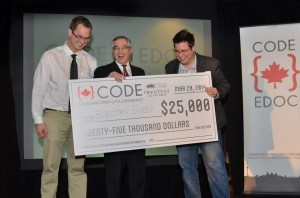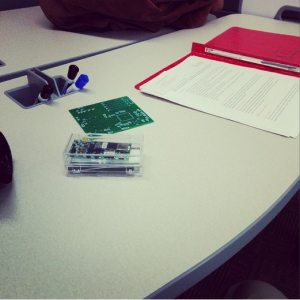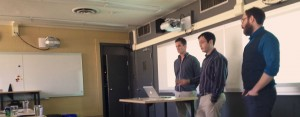A few weeks back I posted about a couple of hackathons I participated in. The first was the OpenData Guelph hackathon which I participated in with my friend from UW Stratford, Carlos Saavedra. We placed 3rd in the contest. Since then, we also found out that our app in the CODE contest, newRoots made it to the top 15 in Canada. The contest had around 900 participants and we were selected to pitch at the final day. While waiting for pitch day, I tried to get involved in anything I could at the University of Guelph to try to improve my pitch skills. I found a practice pitch day that was being put on by the Entrepreneurial Society at the University of Guelph and tried to be active at the event as much as possible.



I have another side project I’ve slowly been working on for a couple years called Redtree Robotics. I decided during an interactive session to try to pitch this idea without even thinking about my pitch. It was terrible. But the speaker allowed me to try again and I managed to reduce what Redtree does into a couple of easy to understand sentences. Later we had to form groups and pitch an idea that would help the city of Guelph deal with a projected 40% population growth in the upcoming years. The team I was assigned and I, came up with the idea of an autonomous car service. During this pitch, I learned the importance of numbers. Things like market size, how much of that market you might be able to reasonably obtain, and how much revenue that might mean to the company. Our pitch for autonomous cars came in third. So there were two big take-aways from this day. Keep your pitch simple and understandable, and focus on numbers.
Carlos and I met before the big CODE2014 pitch and tried to apply these ideas to our pitch. On pitch day, Carlos introduced us and spent the first minute or so giving a very simple and easy to understand explanation of our idea and a tiny bit about who we are. We then showed the video, which showed how our app, newRoots worked. Then I followed up with the numbers. Our strategy worked – we ended up winning the contest and $26000
Following this success, I attended another pitch event put on by the Centre for Business and Social Entrepreneurship at the University of Guelph called “Pitch Envy”. At this event, the guy who started Student Car Share came in and talked more about what a good pitch had in it. Again it was more about numbers, but also an emphasis on a good team. He also talked a bit about how to get investment in a good idea without giving too much of the company away which will likely be useful eventually. I also spoke with a friend, who has a startup named Voltera at UW Velocity about what he thought made up a good pitch. The best advice was to pitch to as many people as possible, one a time and then incorporate their advice into the pitch so it is slowly refined over time.

After two years of part time work on Red Tree Robotics, we decided we would finally try to get some funding. We applied to the Hub, the first incubator program at the University of Guelph. Our team had three members, so the pitch was a challenge. We had to figure out who would say what, and had to get timing down to be under the strict 5 minute deadline. This was the biggest challenge, but once we identified the strengths of each team member, the pitch went really smooth. We ended up winning a spot in the incubator and start May 1st!

If you are interested in following the progress of either of the startups:
Red Tree Robotics: [www.redtreerobotics.com](https://web.archive.org/web/20140417084558/http://www.redtreerobotics.com/) Twitter: @redtreerobotics
ElectricSheep: [www.electricsheep.ca](https://web.archive.org/web/20141010172149/http://www.electricsheep.ca/) Twitter: @2electricsheep